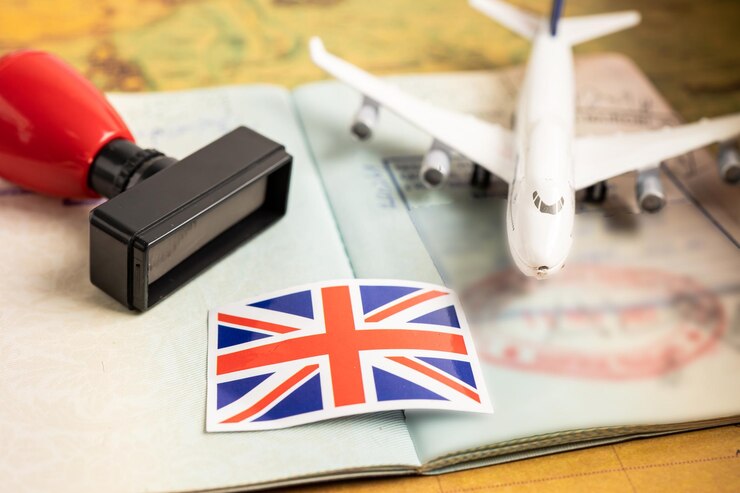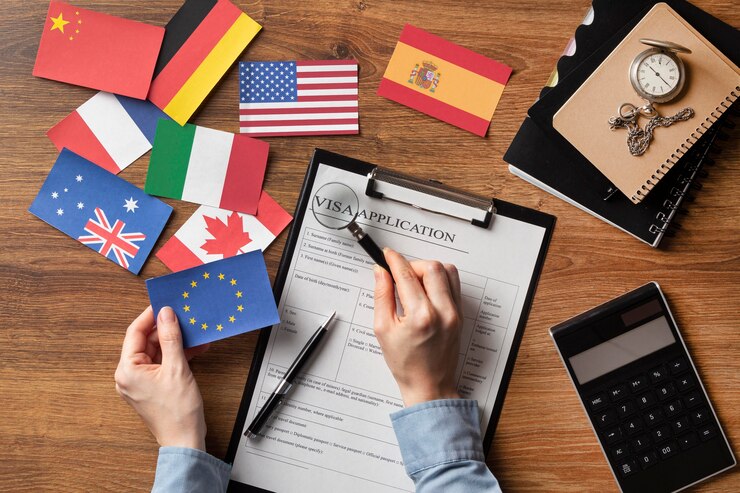The UK immigration system is very complicated. It decides who can come to the UK, stay there, and work there. People come to the UK for work, school, and family reunion, among other reasons, because it is one of the most developed countries in the world.

Anyone who wants to move to the UK or figure out how to follow its rules and laws needs to know how the immigration system works.
A Quick Look at the UK’s Immigration System:
Over the years, and especially since Brexit, the UK’s immigration system has changed a lot. The new system is based on points (PBS), and it works the same for EU members and people who are not from the EU. This method assesses individuals based on specific criteria such as skills, qualifications, and job offers.
The Points-Based System (PBS):
The Points-Based System (PBS) is the core of the UK’s immigration system. It categorizes migrants into different tiers, each with its own set of standards. The PBS aims to attract skilled workers who can add to the UK economy while controlling the number of low-skilled workers entering the country.
Tier 1: High-Value Migrants:
This tier is created for people with exceptional talents, entrepreneurs, and investors. There are several groups within this tier:
Tier 1 (Exceptional Talent) Visa:
This visa is for people recognized as leaders or rising leaders in their field, whether in the arts, sciences, engineering, or humanities.
(Investor) Visa:
Designed for high-net-worth individuals who wish to invest a large amount of money in the UK economy.
(Entrepreneur) Visa:
For those looking to set up or run a business in the UK. Applicants must have access to financial funds.
(Graduate Entrepreneur) Visa:
For recent graduates who have been endorsed for having a real and credible business idea.
Tier 2: Skilled Workers:
Tier 2 is for skilled workers with a job offer from a UK company. This tier is further split into several categories:
(General) Visa:
This visa is for people who have a job offer from a licensed UK employer. The job must meet the minimum skill level and salary threshold.
(Intra-Company Transfer) Visa:
For employees of international companies who are being transferred to a UK branch.
(Sportsperson) Visa:
For elite athletes or coaches recognized as being at the highest level of their career.
(Minister of Religion) Visa:
For individuals offered a role within a faith group, such as a minister, pastor, or religious leader.
Tier 4: Students:
Tier 4 is especially for international students who wish to study in the UK. There are two main categories:
(General) Student Visa:
For students aged 16 or over who have been offered a place on a course at an approved UK educational institution.
(Child) Student Visa:
For children aged 4 to 17 who have been offered a place at an independent school in the UK.
Tier 5: Temporary Workers:
Tier 5 is for temporary workers and youth mobility plans. It includes groups like:
(Youth Mobility Scheme) Visa:
For young people from member countries who wish to live and work in the UK for up to two years.
(Temporary Worker) Visa:
For people coming to the UK for a short-term work assignment in areas like charity work, religious work, or creative arts.
The EU Settlement Scheme:
Post-Brexit, the UK implemented the EU Settlement Scheme to allow EU, EEA, and Swiss citizens to continue living in the UK after the end of the transition period. Those who were living in the UK by December 31, 2020, could apply for settled or pre-settled status.
Settled Status:
This status is for those who have stayed in the UK for a continuous period of five years. It allows people to stay in the UK forever, with the same rights to work, study, and access benefits as British citizens.
Pre-Settled Status:
For those who have not yet lived in the UK for five years, pre-settled status grants them the right to stay in the UK until they hit the five-year mark, after which they can apply for settled status.
Family Visas:
The UK immigration system also offers routes for family members of British citizens or settled persons to join them in the UK. These visas include:
Spouse or Partner Visa:
For the spouse, civil partner, or single partner of a British citizen or settled person.
Parent Visa:
For parents of a child who is a British citizen or settled person.
Child Visa:
For children of a British citizen or settled person.
Adult Dependent Relative Visa:
For adult relatives who need long-term care from a family member living in the UK.
Asylum and Refugee Protection:
The UK is a signatory to the 1951 Refugee Convention and offers protection to people who have fled persecution in their home country.

Asylum seekers can ask for refugee status if they fear persecution due to their race, religion, nationality, political opinion, or membership in a particular social group.
Asylum Process:
The asylum process in the UK includes several stages:
Application:
Asylum seekers must apply for asylum upon arrival in the UK or as soon as they think it is unsafe to return to their home country.
Screening:
Applicants face a screening interview to gather basic information about their identity and reason for seeking asylum.
Substantive Interview:
A detailed interview where the applicant must explain their reasons for wanting asylum and provide proof of their persecution.
Decision:
The Home Office will decide whether to give refugee status, humanitarian protection, or refuse the claim.
Humanitarian Protection:
If an asylum seeker does not qualify as a refugee but still faces a serious risk of harm if they return to their home country, they may be given humanitarian protection. This status gives them to stay in the UK for five years, after which they can apply for indefinite leave to remain.
Indefinite Leave to Remain (ILR):
Indefinite Leave to Remain (ILR) is a form of legal residency in the UK. It lets individuals to live, work, and study in the UK without any time restrictions. After holding ILR for a certain time, individuals can apply for British citizenship.
Eligibility for ILR:
Eligibility for ILR depends on the visa category under which a person is living in the UK. Generally, one must have lived in the UK for a continuous period, usually five years, although this can vary based on the visa type. Other requirements include passing the Life in the UK Test and meeting the English language proficiency standards.
British Citizenship:
British citizenship is the final step for those looking to settle forever in the UK. It gives full rights and privileges, including the right to vote, work without restrictions, and apply for a British passport.
Routes to British Citizenship Naturalization:
The most popular route, available to those who have lived in the UK for at least five years and hold ILR for at least one year.
Registration:
A route mainly for children born in the UK to non-British parents who later acquire citizenship or ILR.
Descent:
For people born outside the UK to British parents, depending on specific circumstances.
Visa-Free Entry and Visitor Visas:
The UK offers visa-free entry to citizens of certain countries for short visits, usually up to six months. However, visitors are not allowed to work, study, or marry without the appropriate visa. For those who require a visa, the UK gives several visitor visa categories, such as:
Standard Visitor Visa:
For tourism, visiting family, or short work trips.
Marriage Visitor Visa:
For those coming to the UK to get married or enter a civil partnership.
Permitted Paid Engagement Visa:
For short-term, paid work tasks, such as lectures or performances.
Challenges and Criticisms of the UK Immigration System:
While the UK immigration system is meant to be fair and systematic, it has faced criticism on various fronts. Here are some of the key issues and criticisms:
Complexity and Bureaucracy:
The UK immigration system is often criticized for its complexity, with many finding it difficult to manage the various rules and requirements.

The application process can be lengthy, needing extensive documentation and often leading to delays.
Financial Barriers:
The cost of asking for visas and other immigration services in the UK is high. This can be a significant barrier for many potential migrants, especially those from lower-income countries or people with limited financial resources.
FAQ:
The UK Immigration System is a set of laws, rules, and processes governing the entry, stay, and exit of people from the United Kingdom. It includes various visa categories, residency options, and paths to citizenship for those looking to work, study, or live in the UK.
What are the main types of visas offered under the UK Immigration System? The main types of visas include:
- Work visas (e.g., Skilled Worker Visa, Global Talent Visa)
- Study cards (e.g., Student Visa, Child Student Visa)
- Family cards (e.g., Spouse Visa, Parent Visa)
- Visitor cards (e.g., Standard Visitor Visa)
- Settlement visas (e.g., Indefinite Leave to Remain)
How does the points-based visa system work?
The UK runs a points-based immigration system, where applicants are awarded points based on specific criteria, such as skills, language proficiency, job offers, and salary levels. To apply for a visa, an applicant must meet a minimum points threshold.
Who needs a visa to enter the UK?
Most non-UK people require a visa to enter the UK. The specific visa needed depends on the purpose of the visit, such as work, study, tourism, or joining family members.
What is the Skilled Worker Visa?
The Skilled Worker Visa lets individuals with a job offer from a UK employer to live and work in the UK. Applicants must meet certain criteria, including having a job offer from an approved sponsor, meeting the needed skill level, and earning a minimum salary.
Can I bring my family to the UK under the visa system?
Yes, certain visas, such as the Skilled Worker Visa and Student Visa, allow you to bring your family members, including your husband, partner, and children, to the UK.
What is Indefinite Leave to Remain (ILR)?
Indefinite Leave to Remain (ILR) is a status given to individuals who have lived in the UK for a specified period, allowing them to stay indefinitely without any time restrictions. It is often a step toward British citizenship.
How can I apply for British citizenship?
To apply for British citizenship, you must usually have ILR or Settled Status, meet residency requirements, show good character, and pass the Life in the UK Test and an English language test.










